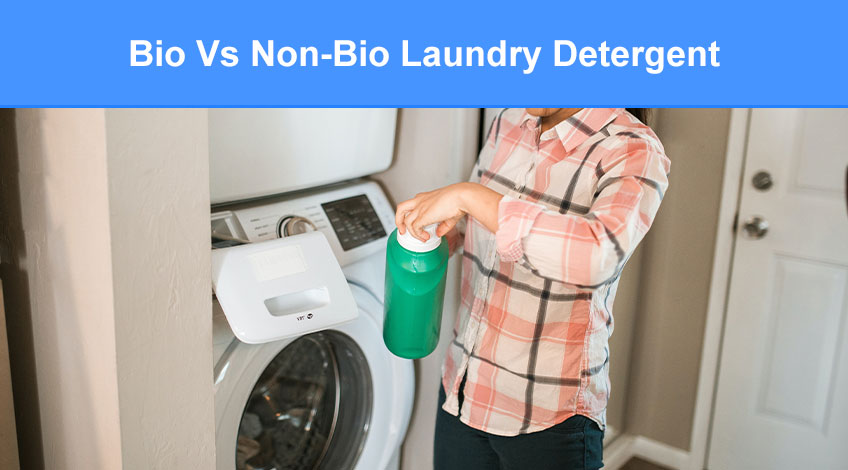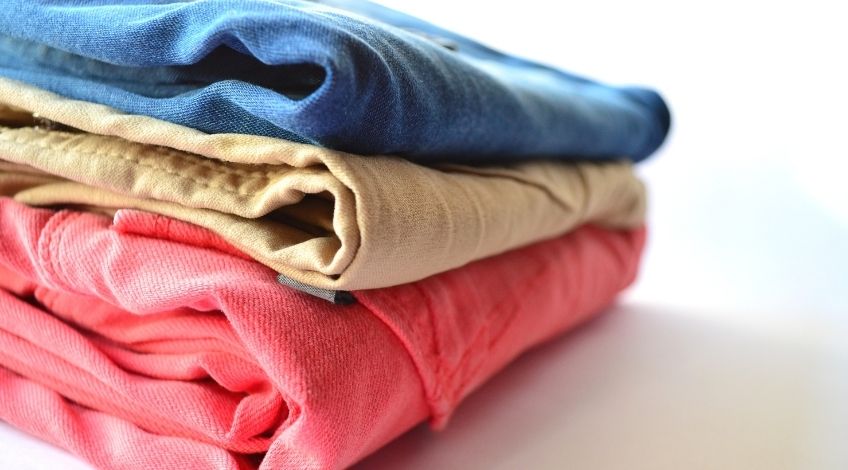
Bio Vs Non-Bio Laundry Detergent: What’s the difference?
If you’ve ever looked along the detergent shelves in your local supermarket, you’ll be aware of just how many different detergents there are on sale. However, for all of those bright, colourful bottles and boxes, there are only really two different types-bio and non-bio.
But what’s the difference? And which should we use? If these are questions that have been bothering you, keep reading.
What’s The Difference Between Bio & Non-Bio Detergents?
The two types of detergents available in stores are bio & non-bio, let’s look at the differences between them.
Biological Detergents
The main difference between bio and non-bio detergents is that bio, or biological detergents contain enzymes which break up dirt and stains on clothes. These enzymes work well at cooler temperatures which means using a bio detergent can save you money.
The enzymes in biological detergents attack and break down proteins that are present in many common stains like food, blood, sweat and grease.
Unfortunately, as some natural fibres are protein based, like silk and wool for example, using a biological detergent on items made from these fabrics would likely mean damaging the fabric.
Another point worth mentioning about the enzymes found in bio detergents is they are less effective at higher temperatures. The optimum temperature for using bio detergents is 20 to 40 degrees C. Any higher and the enzymes are less effective which means your clothes are likely to not get all of the stains removed.
There are also some links that biological detergents can aggravate those with sensitive skin. Even though there have been some scientific studies that have concluded biological detergents don’t affect sensitive skin, many of the major detergent manufacturers recommend using non-bio detergents if you or a family member has sensitive skin.
Non-Biological Detergents
Non-biological detergents don’t contain those protein busting enzymes but are still capable of removing stubborn stains. However, you might need to wash the clothes at higher temperatures to ensure all of the stains have gone.
They are also better suited for use on baby clothes, children’s clothes and the clothes of anyone with sensitive skin. As well as for use on protein based fabrics like silk and wool.
Due to the fact that you might need to use higher temperatures to remove stains from these garments when using a non-bio detergent, you should always check the wash care label before washing any delicate fabric.
If the garment cannot be washed at a high temperature, you might need to pretreat the item before washing with a non-bio detergent.
What Are The Pros & Cons Of Bio Detergents?

Let’s summarise the good and bad of biological detergents.
The Benefits
The benefits of using a biological detergent include;
- More Effective Stain Removal
The enzymes in bio detergents are great for breaking down proteins in stains like grease, blood, sweat and foods. - Works Well At Low Temperatures
The enzymes work well in temperatures at the lower end of the scale. Between 20 C to 40 C is where bio detergents work best. - Saves You Money
As they work best at low temperatures, using bio detergents means you use less electricity. This means you save money on energy bills. - Better For The Environment
Using less electricity every time you wash your clothes means you are helping to reduce your overall energy usage.
The Disadvantages
The main disadvantages of using a bio detergent include;
- Not So Effective At High Temperatures
The enzymes used to break down dirt and stains are less effective at high temperatures. Which means using bio detergents in a hot wash could result in some stains remaining. - Can Trigger Allergic Reactions
Many people with sensitive skin have noticed allergic reactions when using biological detergents. - Can Damage Protein Based Fabrics
Natural protein based fabrics like silk and wool can become damaged by those protein busting enzymes found in bio detergents.
What Are The Pros & Cons Of Non-Bio Detergents?

A brief summary of the good and bad of using a non-bio detergent.
The Benefits
The main benefits for using a non-bio detergent include;
- Effective Stain Removal
Just because non-bio detergents don’t contain enzymes to remove stains, the surfactants and other chemicals are just as effective at removing stains. - Safer For Sensitive Skin
Even though there have been a few scientific studies to the contrary, biological detergents have been known to trigger allergic reactions in those with sensitive skin. Non-bios are less likely to cause such flare ups and can even be used safely on baby clothes. - Can Be Used At High Temperatures
Non-biological detergents work well at high temperatures. Which makes them the perfect choice for 60 or 90 degree C wash cycles. - Can Be Used For Delicate Fabrics
As non-bio detergents contain no protein busting enzymes, they can be safely used on protein based fabrics like silk and wool.
The Disadvantages
The main disadvantages of using a non-bio detergent include;
- Not So Effective At Low Temperatures
Non-bio detergents often need to be used at higher temperatures than bio detergents to achieve the same cleaning results. - Uses More Electricity
As hotter wash cycles are required to get clothes clean using non-bio detergents, they use more electricity which will increase your electricity costs. - Not So Good For The Environment
The more electricity you use the greater the environmental impact.
How To Use Bio & Non-Bio Detergents
There’s usually no difference in the way both types of detergent can be used.
Check the instructions on the pack but generally, they can be added to the dispenser drawer as normal or used directly in the drum.
Do Bio Detergents Cause Damage To Clothes?
Generally speaking, using a biological detergent won’t damage your clothes. Unless, of course, they’re made from one of the delicate fabrics like wool or silk for example.
The problem is the enzymes in bio detergents don’t know the difference between the proteins in grease stains and the fabric based proteins found in wool and silk.
Does Washing Clothes using Bio Detergents Cause Them To Fade?

Whilst washing clothes using bio detergents can cause some fading to clothes, there are other reasons that contribute to this.
The amount of agitation the clothes receive in the drum for example as well as the temperature of the water. If you’re finding your colours fading, it’s more likely to be one of those causing it.
Is Using Biological Detergent Bad For Your Skin?
There are people that have found that using a biological detergent can irritate their sensitive skin. As we said earlier, there have been some scientific reports that say that biological detergents are no more damaging to the skin than non-bio alternatives.
Skin Test
However, if you’re unsure, you can do a skin test to determine whether you are sensitive to biological detergents. All you need to do is wash one item (that comes into contact with your skin when you wear it) in a biological detergent. Once it’s dry wear the item and see if you get a rash, any redness or itchiness.
If not, the bio detergent is safe for you to use. However, if you do suffer from any of those symptoms, you should probably stick to a non-bio alternative.
In many cases, it’s the chemicals used to make fragrances in detergents that can cause allergic reactions. If you or a member of your family has sensitive skin, you might be better off using fragrance free detergents.
Are Non-Biological Detergents Better For The Environment?
You would think that if a detergent is safer for use on clothes that are likely to touch a baby’s skin, that it would be better for the environment too.
But that’s not necessarily so because many non-bio detergents contain many damaging surfactants, phosphates and other harmful chemicals.
You’ll need to do your research and look for plant based products if environmental concerns are important to you.
Are There Any Alternatives To Bio & Non-Bio Detergents?
If after reading this article you’re not convinced about either bio or non-bio detergents, there is an alternative.
The Ecoegg
- 🧺 MAKE LAUNDRY A BREEZE: Simply pop an ecoegg Laundry Egg on top of the clothes in the drum. The Laundry Egg is designed to last for up to 70 Washes and after that, simply refill with Laundry Egg fragrance refill of your choice.
- 🤔 HOW DOES IT WORK? Using two types of mineral pellets plus a small amount of detergent encased in a refillable egg, the ecoegg Laundry Egg provides brilliant cleaning for light and dark washes every time!
The Ecoegg Laundry egg is designed to replace laundry detergent and fabric conditioner. It does not contain enzymes, chlorine bleaches, phosphates, parabens, SLS/SLES or palm oil and is rated ‘excellent’ for sensitive skin by Dermatest.
The Ecoegg contains enough ingredients for 70 washes and helps to reduce single-use plastic detergent bottles. After 70 washes, you simply replace the filling without having to replace the egg.
Bio Or Non-Bio: Which Is Better?
These two types of detergents are both designed to get clothes clean. However, they are really designed for different types of laundry. Biological detergents are designed to be used on more robust fabrics at lower temperatures to remove many protein based stains.
Non-biological detergents, on the other hand, are designed to wash more delicate fabrics or clothes that are worn by people with sensitive skin. They should also be used at higher temperatures which makes non-bios a better choice for washing clothes in a hot wash.
That old saying “horses for courses” has never been more appropriate than when it comes to describing bio and non-bio detergents. They are both better for the tasks they were designed for.
As long as you remember that delicate protein based fabrics like silk and wool should never be exposed to the harsh chemicals and enzymes of a biological detergent. And that non-biological detergents need a hotter wash cycle to remove stains, they’re both great.
Having said that with the advent of eco friendly products like the Ecoegg or other good laundry balls, maybe you don’t need either.
SEE ALSO: What Are Laundry Balls? (and how they work)
Frequently Asked Questions
The main difference between bio and non-bio detergents are the presence of enzymes. Enzymes are used in bio detergents to break down dirt and stains at low temperature. These enzymes are not found in non-bio detergents which need hotter water to remove dirt and stains.
It is better to use non-biological detergents on towels because they are kinder to the fabric. Plus, as towels are used on bare skin, non-bio detergent is less likely to cause an allergic reaction. Biological detergents can also cause towels to discolour.
Biological detergents work better at removing stains at low temperatures due to the enzymes they contain. However, non-biological detergents are just as good at stain removal except you might need to use a hotter wash cycle to achieve comparable results.
Also, follow us on Pinterest ...




